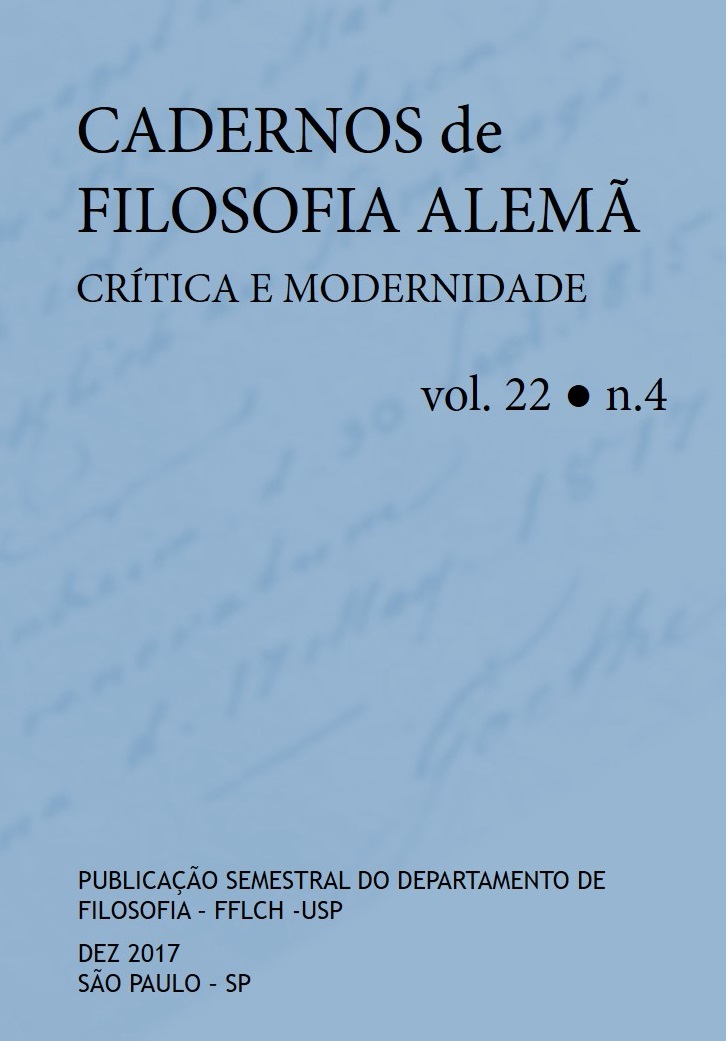Criticize and obey versus gag and disobedience: critiques of Kant to Hobbes
DOI:
https://doi.org/10.11606/issn.2318-9800.v22i4p43-61Keywords:
Hobbes, Kant, freedom of expressionAbstract
The text compares Hobbes's and Kant's views on freedom of expression. Hobbes feared for the destabilizing effects of such freedom, whereas Kant defined it as the most innocent of the liberties, therefore, Kant can mobilize it against certain acts of the sovereign, because of its innocence. The expression of thoughts would be no more than an appeal to the sovereign to reform the law. The text further emphasizes that the reasons for Hobbes to defend censorship are of public order and not the wandering of forbidden doctrines.Downloads
References
Agamben, G. (2004). Estado de exceção. [I. D. Poleti: Stato direitos eccezione]. São Paulo: Boitempo.
Bentham, J. (1838-1843) Essay on the Influence of Time and Place in Matters of Legislation [1780]. In: The Works of Jeremy Bentham. 11 v.; V. 1. Edinburgh: William Tait.
Grotius, H. (2001). On the Law of War and Peace [De jure belii ac pacis (1625)]. Translated by A. C. Campbell. Botoche: Ontario.
Habermas, J. (1997). Direito e democracia: entre faticidade e validade. [v. I]. [Faktizität und Geltung: Beiträge zur Diskurstheorie des Rechts und des demokratischen Rechtsstaats]. Tradução de F. B. Siebeneichler. Rio de Janeiro: Tempo Brasileiro.
Hart, H. L. A. (1955). Are There Any Natural Rights? The Philosophical Review, 64(2), pp.175-191.
Hobbes, T. (1928). The Elements of Law Natural and Politic. Cambridge: Cambridge University Press.
____________. (1968). Leviathan, or Matter, Form, and Power of a Commonwealth Ecclesiastical and Civil. Edited by C.B. Macpherson. London: Penguin.
____________. (1979). Leviatã ou matéria, forma e poder de um estado eclesiástico e civil. [Leviathan, or Matter, Form, and Power of a Commonwealth Ecclesiastical and Civil]. Tradução de J. P. Monteiro e M.B.N. da Silva. 2. ed. São Paulo: Abril Cultural.
____________. (1998). Do cidadão. [Philosophical Rudiments Concerning Government and Society (1651)]. Tradução de R. J. Ribeiro. 2. ed. São Paulo: Martins Fontes.
____________. (2010) Leviathan: sive de materia, forma, et potestate civitatis ecclesiasticae et civilis [1668]. [Thomæ Hobbes Malmesburiensis Opera Philosophica Quæ Latine Scripsit Omnia, Volume 3]. Ed. William Molesworth. Charleston: Nabu Press.
Kant, I. (s/d). Sobre a expressão corrente: isso pode ser correcto na teoria, mas nada vale na prática. Tradução de Artur Morão. Covilhã: Lusofia Press.
____________. (1911). Kant’s gesammelte Schiriften/Kant’s Werke. (28 vs.). (Preussischen Akademie der Wissenschaten). Berlin: Reimer.
____________. (1997). Sobre um suposto direito de mentir. Tradução de Artur Morão. Covilhã: Lusofia Press.
____________. (2005). A metafísica dos costumes [1797]. Tradução de J. Lamego. Lisboa: Fundação Calouste Gulbenkian.
____________. (2008). A paz perpétua: um projeto filosófico. Tradução de Artur Morão. Covilhã: Lusofia Press.
____________. (2014). Princípios metafísicos da doutrina do direito. [Metaphysische Anfangsgründe der Rechtlehre]. Tradução de J. Beckenkamp São Paulo: Martins Fontes.
Mulholland, L. A. (1990). Kant's System of Rights. New York: Columbia University Press.
O’Neill, O. (2010). Toleration, Self-Expression and Communication. Lecture delivered at the University of York and at St John’s College, 31-10-2010, unpublished.
Oakeshott, M. (2000). Hobbes on Civil Association. Indianapolis: Liberty Fund.
Pettit, P. (2008). Made with Words: Hobbes on Language, Mind, and Politics. Princeton and Oxford: Princeton University Press.
Rawls, J. (1999). A Theory of Justice. [Revised Edition]. Oxford: Oxford University Press.
Schmitt, C. (2004). El Leviathan en la teoría del estado de Tomas Hobbes [1938]. Tradução de F. J. Conde. Granada: Comares.
Slomp, G. (2007). Kant against Hobbes: Reasoning and Rhetoric. Journal of Moral Philosophy, 4(2), pp.207-222
____________. (2010). The Liberal Slip of Thomas Hobbes’s Authoritarian Pen. Critical Review of International Social and Political Philosophy, 13(2), pp.357-369.
Volpato Dutra, D.J. (2011). Grotius: pré-história da teoria kantiana da virtude. Dissertatio, 33, pp.439-453.
Waldron, J. (1995-1996). Kant's Legal Positivism. Harvard Law Review, 109, pp.1535-1566.
Warrender, H. (1957). The Political Philosophy of Hobbes. Oxford: Oxford University Press.
Williams, H. (2003). Kant’s Critique of Hobbes. Cardiff: University of Wales Press.
Downloads
Published
Issue
Section
License
Information and conceptions on the texts are complete responsibility of the authors.
All the articles submitted before July 5th 2018 and those published after July 2021 are licensed under a CC BY-NC-ND license – except those published between the aforementioned dates, which are under the CC BY-NC-SA license. The permission for the translation of the material published under the license CC BY-NC-ND by third parts can be obtained with the consent of the author.
Open access policies - Diadorim
Rules applied before July 5th 2018:
Presenting a submission to our Editorial Board implies granting priority of publication for “Cadernos de filosofia alemã”, as well as transferring the copyright of texts (once published), which will be reproduced only with the manifest authorization of the editors. Authors keep the right to reuse the texts published in future editions of their work, without paying any fees to "Cadernos”. We will not grant the permission to re-edit or translate the texts for third parts without agreement of the author.


